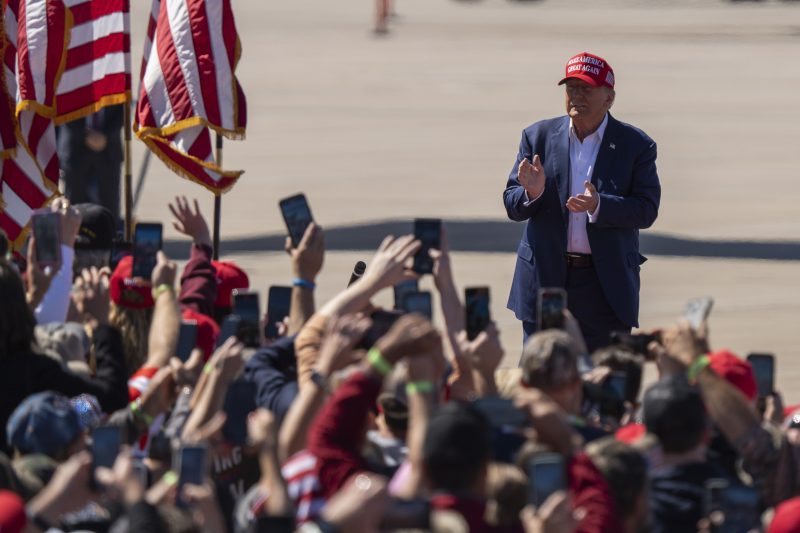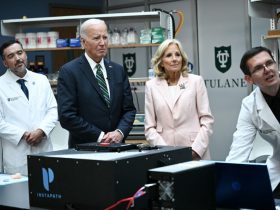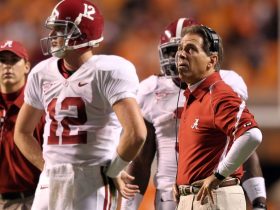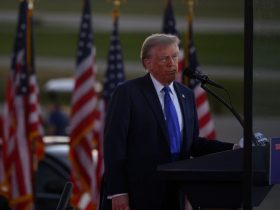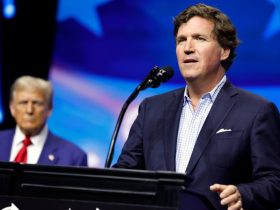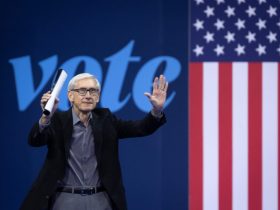MOSINEE, Wis. — Former president Donald Trump wants to correct the record: Actually, women love him.
“Somebody said women don’t like Donald Trump,” the Republican presidential nominee told the crowd at a recent rally in Johnstown, Pa. “That’s wrong. I think they love me, I love them.”
Polling says otherwise.
President Joe Biden won women by 15 points over Trump in 2020, according to exit polls, up from former secretary of state Hillary Clinton’s 13-point victory among women in 2016. Polls suggest that this year, women prefer Democratic presidential nominee Kamala Harris over Trump by similar margins. Harris led Trump by 13 points among women in an ABC News/Ipsos poll released last Sunday. Before the Democratic National Convention last month, the same poll found her leading him by six points among women.
Trump appears to be trying to narrow that gap. In just the past several weeks, he has promised to have the government or private insurance companies pay for in vitro fertilization treatments (without offering specifics), debuted a muddled, confusing plan to address child-care costs (“a very important issue”) and promised his administration “will be great for women and their reproductive rights” (though he has also bragged about appointing three of the Supreme Court justices who overturned Roe v. Wade). But he also spent much of a 49 minute news conference Friday railing against women who have accused him of sexual misconduct, describing their allegations as meritless.
At a rally Saturday in Mosinee, Wis., Trump again said he supports exceptions to abortion bans in cases of rape or incest, or to protect the life of the mother. But he also continued to praise the Supreme Court justices who made strict abortion bans possible by overturning Roe, saying he was “happy we had Supreme Court justices that had the courage to do that.”
“We did a great thing when we got Roe v. Wade out of the federal government,” the former president said. “We put it in the hands of the people and they’re voting.”
Trump’s rush of comments on child care, abortion rights and IVF are “clearly an effort to appeal to female voters,” said Tresa Undem, a partner at PerryUndem research, a polling firm that studies gender issues. But she predicted Trump’s efforts would not have much impact.
“Maybe some of his pro choice voters … maybe it sort of provides a little bit of relief if they hear he supports IVF, if they hear he supports abortion in some cases,” Undem said. “But I don’t think it’ll draw voters to him.”
In interviews at Trump’s rally at an airport in this small central Wisconsin city, women who support him said they were surprised by the gender gap in polling. Only some attendees had heard about his IVF proposal. Several said they were pro-life but supported his messaging that abortion laws should be left up to the states.
“I’m not going to vote for someone because they’re a woman,” said Pam Botwinski, a 68-year-old rally attendee from Mosinee, referring to Harris. “They always say he’s against women,” she added, before noting that Trump employs women throughout his campaign. “I mean come on, open your eyes.”
Darcy Yde, a nurse who also attended the Mosinee rally, described Trump’s IVF proposal as “pro-life” and said it could help him attract more female voters. She also acknowledged Trump’s latest messaging on abortion.
“He doesn’t want to turn off voters so he has to be a little muddy about that, I understand that,” Yde said, who identified herself as pro-life. “I think that it’s okay. I think that’s a subject that we’ve gone through so many times and I think people just kind of put it to the side because there are other big issues to contend with.”
In response to a request for comment, the Trump campaign did not expand on his IVF or child care statements and did not offer more detail on how the campaign plans to appeal to female voters.
Democrats hope that at least some Republican women will follow the lead of former congresswoman Liz Cheney and other GOP women who have turned against Trump.
“They’re misogynistic pigs,” Cheney, who represented Wyoming and has been a fierce Trump critic, said of Trump and Vance in an interview on Friday. “If you listen to what [Vance] he said about women and you look at Donald Trump, and what he has done and what he says about women, these are not people we can entrust with power again.”
Trump’s event in Mosinee had all the traditional trappings of a Trump rally. Attendees held signs that said “Drain the Swamp.” A screen behind the stage featured messages that highlighted the approaching the Nov. 5 election, encouraging attendees to “Make a plan to Vote” and to volunteer for the campaign. But Trump spoke behind bulletproof glass, a recent change since a gunman attempted to assassinate him in Butler, Pa., in July.
Attendees cheered as Trump’s airplane, Trump Force One, flew overhead, and they chanted “Fight, Fight, Fight” — echoing Trump’s own words after the assassination attempt — as he came onto the stage.
Trump’s speech was billed as focused on “draining the swamp,” but the former president, as he often does, rambled from subject to subject, complaining about immigrants, transgender people and his legal cases, and peppered his comments with falsehoods, including baseless claims that the Bureau of Labor Statistics intentionally manipulated its job numbers and that all new jobs are going to undocumented immigrants.
Trump didn’t talk about his IVF proposal or revisit his child care comments at Saturday’s rally. But he found time to compliment some of his fans from North Carolina on their hair. “I never see their husbands, so I don’t know what the hell is going on there,” he said. “Beautiful. And they’re always perfectly coifed. That means they have money.”
Trump received 56 percent and 58 percent of the vote in Marathon County, Wis., in 2016 and 2020, outperforming Mitt Romney and President George W. Bush. President Barack Obama is the only Democratic presidential candidate to carry the county in recent years, winning it in 2008.
The rally marked Trump’s second visit to Wisconsin in a little more than a week. Harris leads by four points in the state, according to The Washington Post’s polling average.
Dan Keating and Emily Guskin contributed to this report.

